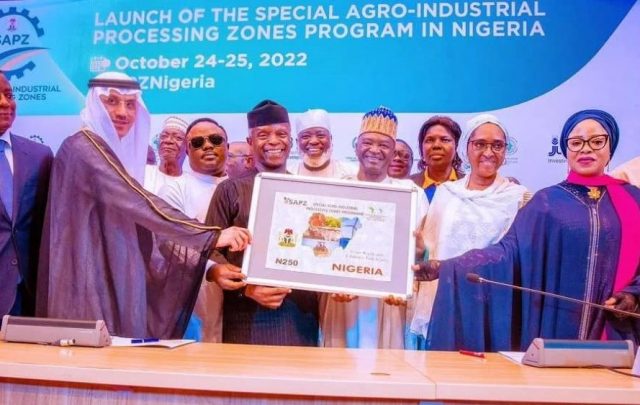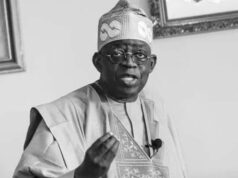
TUES, 25 OCT, 2022-theGBJournal| With the launch of the Special Agro-industrial Processing Zone (SAPZ) programme, Nigeria can, in less than a decade, banish food insecurity, while radically improving export earnings from agriculture, creating millions of lucrative agro-industrial jobs and opportunities for its citizens.
This was stated by Vice President Yemi Osinbajo, SAN, when he represented President Muhammadu Buhari on Monday at the Official Launch of the Special Agro-Industrial Processing Zones in Nigeria, held at the Ministry of Foreign Affairs, Abuja.
Prof. Osinbajo noted that the launch of the SAPZ programme heralded a “profoundly important moment in our agricultural odyssey.”
“If the Special Agro-Industrial Processing Zones programme delivers on its objectives and we have no doubt that it will, then we would in less than a decade deal a fatal blow to food insecurity, create millions of good paying agro-industrial jobs and opportunities and radically improve export earnings from agriculture,” the Vice President stated.
According to him, the Programme was “a clear plan for the industrialization of agriculture, the deliberate development of value chains in the crops farmers grow and a pathway to net exportation of their produce.”
Highlighting the significance of the SAPZ programme to Nigeria, the Vice President noted that “the programme is now a critical component of our agricultural strategy, which is to accelerate the industrialization of our agricultural sector with the objective of being ahead of our constraints in providing food, nutrition and wealth for the largest population in our continent.”
“The Nigeria Special Agro-Industrial Processing Zones programme (The SAPZ programme) is a government-enabled and private sector-led initiative that will to mobilize private sector investment to develop value chains for selected strategic crops and livestock in the Participating States. Nigeria will implement the first phase of the SAPZ programme with co-financing from the African Development Bank, the International Fund for Agricultural Development (IFAD) and the Islamic Development Bank (IsDB),” he added.
The Vice President, who noted that the SAPZ programme was recently approved by the Federal Executive Council, stated that the programme “is a major cross-cutting value chain investment effort driven by the Federal Ministry of Agriculture and Rural Development, in alignment with the National Agricultural Technology and Innovation Policy of the Federal Government to incentivise agro-industrialization for private sector development.
“The SAPZ programme is a five-year programme, being implemented by the Federal Government of Nigeria (FGN) in partnership with the African Development Bank (AfDB), the International Fund for Agricultural Development (IFAD), Islamic Development Bank (IsDB), state governments and private investors, in seven (7) participating states (Kano, Imo, Kaduna, Cross River, Kwara, Oyo and Ogun) and the Federal Capital Territory (FCT).”
In the first phase, the VP noted that the programme is expected to achieve significant milestones, including reducing the country’s current food import bill through Import Substitution, boosting revenue from agricultural exports, creating wealth for rural farming communities, and creating new sustainable jobs, especially for women and youths.
He added that the programme will also “stem rural-urban migration, boost rural livelihoods and revive stranded public and private sector funded assets; and decisively improve food security.”
SAPZ will also “vastly improve the business environment for agro-industrial processors as it will improve their productivity and enable value addition for inclusive, adaptive economic growth.
“In the next phase, we will bring on board another 18 States. The SAPZs also stand to benefit from two salutary developments: technology and innovation, and the African Continental Free Trade Agreement (AfCFTA),” the Vice President added.
On the opportunities that AfCFTA will offer, the Vice President said the Agreement would open up for Nigeria to be the breadbasket and the agri-business hub of the region.
“This convergence of resource and opportunity is certainly auspicious for the great impact that we look forward to from the SAPZs. The operation of the SAPZs will also leverage other Federal and State programmes including the National Livestock Transformation Plan (NLTP: 2019 – 2028), and the Nigeria Industrial Revolution Plan (NIRP),” he stated.
Further highlighting the importance of agriculture to Nigeria’s economy, Prof. Osinbajo noted that “The agricultural sector was pivotal in pulling our economy out of recession and is the single largest employer of labour, so we must incentivise agriculture through greater investments and an enabling environment for private sector participation, and to advance our national agro-industrialization drive.
“The Federal Government of Nigeria is profoundly proud of the strategic relationships with the African Development Bank (AfDB), the International Food for Agricultural Development (IFAD) and the Islamic Development (IsDB) over the years in building long-term national prosperity for our country through agriculture. And we thank them for their steadfast support through the years.”
The event also featured remarks (delivered virtually) from the President, the African Development Bank Group, Dr. Akinwumi Adesina.
The AFDB president noted that despite its massive agriculture potential, Africa still faced huge challenges in meeting its food needs, with 283 million people that go hungry annually.
“Agriculture is critical for the survival of any nation. The most important role of any nation is to feed its people. Food is a fundamental human right,” he said, adding that the African Development Bank is also supporting Nigeria, through Technologies for African Agricultural Transformation (TAAT) to produce more wheat, rice and maize.”
“This support will allow Nigeria to cultivate by next year 900,000 hectares of rice, 250,000 hectares of wheat and 107,000 hectares of maize,” he added.
The Presidential launch also featured remarks by representatives of IFAD and the Islamic Development Bank as well as the Cross River State Governor, Prof. Ben Ayade; Minister of Agriculture and Rural Development, Dr. Mohammad Mahmood Abubakar; Minister of Finance, Budget and National Planning, Dr. (Mrs.) Zainab Shamsuna Ahmed; and the Minister of Industry, Trade & Investment, Otunba Niyi Adebayo, among other senior government and regional representatives.
In another development on Monday, Vice President Yemi Osinbajo said the relationship between Nigeria and the Islamic Development Bank (IsDB), was helpful, noting that the bank “understands the nuances of countries in the global South and for that reason, you (IsDB) are able to be more creative and more sensitive to our needs when you consider requests coming from us.”
Using the example of the funding request for the Nigerian-Moroccan Pipeline project, the VP said “if given all of the considerations today with the global North Development Finance Institutions, we (Nigeria) will not be considered favourably for the facility because of the talk about defunding fossil fuel projects and all that. But it is evident that we cannot do without fossil fuels at least for the next several decades and we have fossil fuels, this is a natural resource for us and it is available not just for industry alone but also for cooking.”
“I think that we are fortunate that we have IsDB, they are there… if we were to be subjected to the policies of the global north DFIs, we will be in serious trouble. So, I thank you again, and to say that the collaboration between the Bank and Nigeria is a strong one and one that we respect greatly,” Prof. Osinbajo added.
Earlier in his remarks, the President and Chairman of the IsDB, Mr Muhammed Al Jasser said Nigeria is one of the bank’s most valued partners, noting that the relationship between Nigeria and IsDB will continue to grow stronger.
Mr Jaseer reiterated the bank’s commitment to support the Federal Government’s economic diversification efforts, especially through agricultural industrialization.
Accompanying him to the meeting was the Nigerian-born Vice President of the bank, Dr Mansur Mukhtar. The Finance Minister, Mrs Zainab Ahmed and the FCT Minister of State, Hajiya Ramatu Tijjani were also at the meeting.
Twitter-@theGBJournal| Facebook-The Government and Business Journal|email: gbj@govbusinessjournal.ng|govandbusinessj@gmail.com









